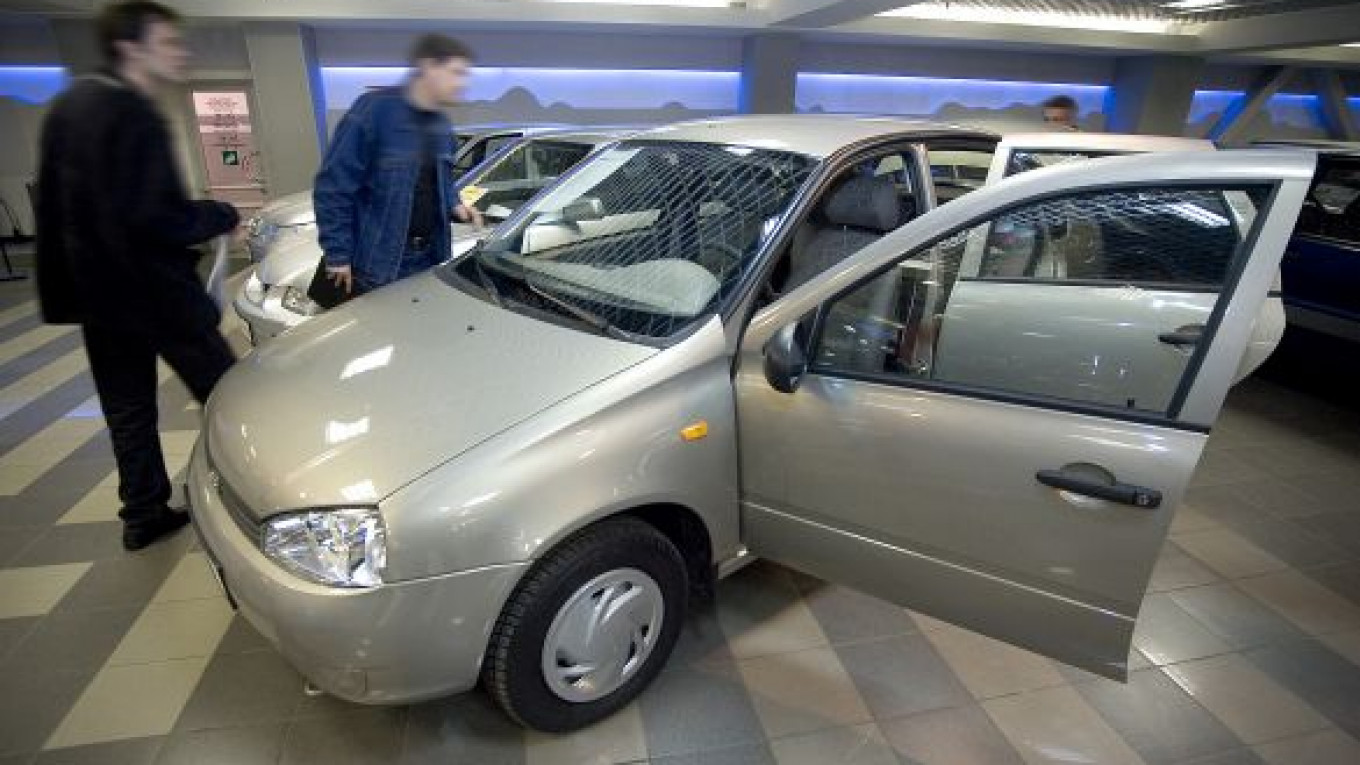Russia's new car market will rise to 4 million in annual sales by the middle years of the current decade, an influential auto industry trade group has said.
According to the Association of European Businesses, new car sales, often seen as a barometer of economic health, continued a post-crisis recovery in 2011, surging 39 percent compared with 2010.
"Four million will happen — but not in a straight line," David Thomas, the chairman of AEB's automobile manufacturers' committee told reporters after presenting figures for annual sales in 2011 on Thursday.
Russians bought 2.65 million new cars and light vehicles in 2011, according to figures compiled by the committee based on member companies' sales figures.
That's up 39 percent on 2010, but still a long way short of the 3 million cars sold at the peak of the market in 2008.
Sales crashed to 1.5 million in 2009 and have been recovering since. The market may now hit the much-vaunted 4-million mark "maybe in 2014, maybe by 2017," Thomas said.
"We might have expected 2 million or 2.25 million a year ago — so the pace of growth has been faster than expected," Thomas said.
Growth was fastest at the beginning of the year, with sales surging 74 percent year on year in January to March. By the last quarter growth had slowed to 23 percent.
Lada's Kalina, Priora and Samara models remain the most popular in the country. The brand sold 578,387 new cars in 2011 — up 11 percent from last year. The Avtovaz-Renault-Nissan alliance, which owns Lada, said earlier this week that global sales leapt 10 percent to a record 8.03 million.
The most popular foreign brand was GM group's Chevrolet, which sold 173,484 new cars, up 49 percent from 116,223 last year.
Another big winner was Volkswagen, whose Kaluga production plant hit full capacity, with round-the-clock production for the first time this year. The group, which includes the Volkswagen, Skoda and Audi brands, saw sales jump 74 percent. Volkswagen sales alone doubled, from 58,989 to 118,003 last year.
Marcus Osegowitsch, general director of the Volkswagen group in Russia, put it down to "having the right product" — specifically the Polo sedan, designed especially for the Russian and Indian markets, and the Tiguan SUV.
Most executives remain bullish on the Russian market, pointing to Russia's relatively low level of car ownership, high average age of cars currently on the road, and expansion of networks in the regions that continues to open up new opportunities away from saturated markets like Moscow and St. Petersburg.
"The general outlook is perfect," Osegowitsch said. "The question is what happens between here and there."
AEB forecast 2.8 million sales in 2012, but Thomas emphasized that the figure is a mean estimate taken from a range of forecasts by member companies and the final figure would probably be different.
"In the worst-case scenario we'd likely see a flatline, remaining at 2.6 million. That would be associated with a serious European crisis and that crisis impacting on Russia. The most optimistic estimates say we could see as many as 3 million sales," he said when asked about the range of estimates from various companies.
But uncertainty about the state of the global economy tempers optimism with caution. "We see growth," said a Russian executive at another foreign auto firm who asked for anonymity because he was not authorized to speak to the press, "but 3 million is too optimistic."
Chrysler Group will put the finishing touches on its plans to build Jeep SUVs in Russia in the first half of this year, Bloomberg reported Thursday.
Brand chief Mike Manly told the news agency that the company is looking at production partnerships in Russia. Sollers, Russia's second-largest automaker, terminated its agreement with Chrysler's majority owner Fiat last year.
Jeep's sales in Russia more than doubled last year to 2,093, up from just 809 vehicles in 2010.
A Message from The Moscow Times:
Dear readers,
We are facing unprecedented challenges. Russia's Prosecutor General's Office has designated The Moscow Times as an "undesirable" organization, criminalizing our work and putting our staff at risk of prosecution. This follows our earlier unjust labeling as a "foreign agent."
These actions are direct attempts to silence independent journalism in Russia. The authorities claim our work "discredits the decisions of the Russian leadership." We see things differently: we strive to provide accurate, unbiased reporting on Russia.
We, the journalists of The Moscow Times, refuse to be silenced. But to continue our work, we need your help.
Your support, no matter how small, makes a world of difference. If you can, please support us monthly starting from just $2. It's quick to set up, and every contribution makes a significant impact.
By supporting The Moscow Times, you're defending open, independent journalism in the face of repression. Thank you for standing with us.
Remind me later.






